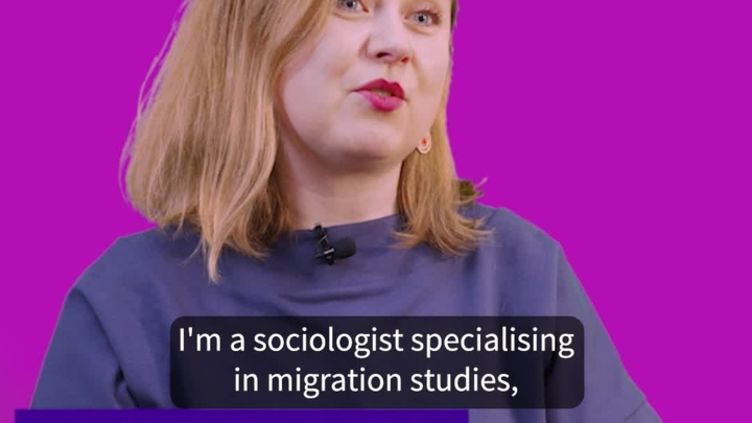Dr Aneta Piekut
Sheffield Methods Institute
Senior Lecturer in Quantitative Social Sciences


+44 114 222 6288
Full contact details
Sheffield Methods Institute
The Wave
2 Whitham Road
Sheffield
S10 2AH
- Profile
-
Dr Aneta Piekut joined the Sheffield Methods Institute in 2014. Before that she worked as a researcher at the Universities of Warsaw (the Centre of Migration Research, 2005-2009), Leeds and Sheffield (2010-2014). She completed her PhD studies at the University of Warsaw in 2009.
Aneta is Co-Director of the Migration Research Group - an interdisciplinary research network in the Faculty of Social Sciences.
She is a mixed methods sociologist and her research spans disciplinary boundaries. Her research focuses on ethnic diversity, socio-spatial segregation and social cohesion, attitudes towards immigration and ethnic minorities, including their measurement and the problem of survey nonresponse.
She published widely in leading academic journals on issues of migration, ethnicity and segregation (e.g. European Sociological Review, Sociology, Social Science Research, Social & Cultural Geography, International Sociology), and in 2017 she won the prestigious SAGE Prize for Innovation and Excellence awarded by the British Sociological Association’s (BSA) for a paper published in Sociology journal.
- Publications
-
Books
Journal articles
- The growing importance of reproducibility and responsible workflow in the data science and statistics curriculum. Journal of Statistics and Data Science Education, 30(3), 207-208.


- An invitation to teaching reproducible research: lessons from a symposium. Journal of Statistics and Data Science Education.


- Impact of Household Structure Complexity on the Propensity to Avoid Answering the Question Measuring Total Net Income in the European Social Survey, 2008-2018. Studia Socjologiczne, 2022(2), 165-189.


- Brexit and beyond: Transforming mobility and immobility. Central and Eastern European Migration Review, 9(1), 5-12. View this article in WRRO


- Survey nonresponse in attitudes towards immigration in Europe. Journal of Ethnic and Migration Studies. View this article in WRRO


- Segregation in the twenty first century: Processes, complexities and future directions. Tijdschrift voor Economische en Sociale Geografie. View this article in WRRO


- Frontiers in Residential Segregation: Understanding Neighbourhood Boundaries and Their Impacts. Tijdschrift Voor Economische En Sociale Geografie. View this article in WRRO


- Spaces of encounter and attitudes towards difference: A comparative study of two European cities. Social Science Research, 62, 175-188. View this article in WRRO


- Attitudes towards the ‘stranger’: negotiating encounters with difference in the UK and Poland. Social & Cultural Geography, 18(1), 16-33. View this article in WRRO


- Perceived Diversity and Acceptance of Minority Ethnic Groups in Two Urban Contexts. European Sociological Review, 32(3), 339-354. View this article in WRRO


- ‘Other’ Posts in ‘Other’ Places: Poland through a Postcolonial Lens?. Sociology, 50(1), 60-76. View this article in WRRO


- ‘Big Brother welcomes you’: exploring innovative methods for research with children and young people outside of the home and school environments. Qualitative Research, 15(5), 583-599. View this article in WRRO


- Mapping the meaning of ‘difference’ in Europe: A social topography of prejudice. Ethnicities, 15(4), 568-585. View this article in WRRO


- Intimate encounters: The negotiation of difference within the family and its implications for social relations in public space. Geographical Journal. View this article in WRRO


- Seeking ‘the New Normal’? Troubled spaces of encountering visible differences in Warsaw. Polish Sociological Review, 2014(4). View this article in WRRO


- Migration and modernisation - An alternative. polemic essay with Marek Okólski's article "modernising impacts of emigration". Studia Socjologiczne(1), 157-169. View this article in WRRO


- You’ve got Starbucks and Coffee Heaven... I Can Do This! Spaces of Social Adaptation of Highly Skilled Migrants in Warsaw. Central and Eastern European Migration Review, 2(1). View this article in WRRO


- Multidimensional diversity in two European cities: Thinking beyond ethnicity. Environment and Planning A, 44(12), 2988-3009. View this article in WRRO


- Czy mamy juz w Polsce mala Ukraine i polskie Viettown? Spoleczno-przestrzenne wzory zamieszkiwania imigrantów w metropolii warszawskiej. Studia Lokalne i Regionalne, 4(30). View this article in WRRO


- ‘They made bets that I’d die’: Impacts of COVID-19 on Polish essential workers in the UK. Journal of Ethnic and Migration Studies, 1-19.


- Not Random and Not Ignorable. An Examination of Nonresponse to Income Question in the European Social Survey, 2008–2018. Field Methods.


- Generation-making narratives and responses to diversity in Poland. International Sociology, 026858092199852-026858092199852.


Chapters
- Postawy wobec imigrantów w „starych” i „nowych” krajach imigracyjnych. Czy historia imigracji ma znaczenie? In Sztabiński P, Przybysz D & Sztabiński F (Ed.), Polska - Europa. Wyniki Europejskiego Sondażu Społecznego 2002-2018/19 (pp. 92-113). Warsaw: Wydawnictwo Instytutu Filozofi i i Socjologii PAN.


- Re-Theorising Spatial Segregation: A European Perspective, The Urban Book Series (pp. 13-38). Springer International Publishing


- Kosmopolityczna Praga? W poszukiwaniu (nowej) tożsamości
praskiej In Górny A, Toruńczyk-Ruiz S & Winiarska A (Ed.), Po sąsiedzku z różnorodnością. Interakcje w miejskich przestrzeniach lokalnych z perspektywy różnych grup mieszkańców (pp. 155-197). Warsaw: Scholar.


- Integracja migrantów w społeczeństwie przyjmującym In Lesińska M & Okólski M (Ed.), 25 wykładów o migracjach (pp. 178-195). Warsaw: Wydawnictwo Naukowe Scholar.


- Unpacking Prejudice: Narratives of Homophobia in Cross-National Context In Vieten UM & Valentine G (Ed.), Cartographies of Differences. Interdisciplinary Perspectives (pp. 15-40). Oxford, Bern, Berlin, Bruxelles, Frankfurt am Main, New York, Wien: Peter Lang.


- Visible and Invisible Ethnic ‘Others’ in Warsaw: Spaces of Encounter and Places of Exclusion In Grubbauer M & Kusiak J (Ed.), Chasing Warsaw Socio-Material Dynamics of Urban Change since 1990 Campus Verlag


- From (many) datasets to (one) integration monitoring system in Poland? In Bijn R & Verweij A (Ed.), Measuring and Monitoring Immigrant Integration in Europe. Integration Policies and Monitoring Efforts in 17 European Countries


- Wybrane aspekty integracji imigrantów: w poszukiwaniu mechanizmów sprzyjających dalszemu napływowi cudzoziemców do Polski [Selected aspects of immigrant integration: Searching for mechanisms supporting further inflow of foreigners to Poland] In Górny A, Grabowska-Lusińska I, Lisińska M & Okólski M (Ed.), Transformacja nieoczywista. Polska jako kraj imigracji (pp. 188-231).


- Integration: A Supplementary Driver of Immigration? In Górny A, Grabowska-Lusińska I, Lesińska M & Okólski M (Ed.), Immigration to Poland: Policy – Labour Market – Integration (pp. 151-194).


- Społeczny wymiar integracji [The social dimension of integration] In Gorny A, Grabowska-Lusinska I, Lesinska M & Okolski M (Ed.), Transformacja nieoczywista. Polska jako kraj imigracji (pp. 202-216).


- Adaptacja imigrantów na lubelskim rynku pracy [Immigrant adaptation in Lublin city labour market] In Kaczmarczyk P (Ed.), Migracje zagraniczne a procesy rynku pracy – przypadek Lubelszczyzny (pp. 63-88).


- Wielość wymiarów – zatem jaka integracja? Przegląd tematyki i metod badań integracyjnych In Grzymala-Kazłowska A & Łodziński S (Ed.), Problemy integracji imigrantów koncepcje, badania, polityki Wydawnictwa Uniwersytetu Warszawskiego


Book reviews
- Book review: "Ethnic Diversity and Social Cohesion. Immigration, Ethnic Fractionalization and Potentials for Civic Action" by Merlin Schaeffer, Ashgate, 2014. Central and Eastern European Migration Review, 1(3), 137-140. View this article in WRRO


Conference proceedings papers
- OP36 What pathways have been theorised and tested between ethnic density and mental ill-health?: A theory-based systematic review. Oral Presentations


Website content
- Polish key workers feel unwelcome in the UK thanks to Brexit plus COVID.


- Stopping segregation: it’s not just where you live, it’s the places you go that matter.


- You’re probably wrong, but there’s data to understand why.


- Using Eurovision to explain sampling bias.


- Revealed: the truth about ethnic diversity of neighbourhoods.


Working papers
- The tale of two cities: Diversity in Leeds and Warsaw. Working Paper of the University of Leeds, School of Geography, 11. View this article in WRRO


Datasets
- The growing importance of reproducibility and responsible workflow in the data science and statistics curriculum. Journal of Statistics and Data Science Education, 30(3), 207-208.
- Grants
-
Duration
Role
Project title
Awarding body
Funding amount
2024-2025 Co-Investigator Storying Life Courses for Intersectional Inclusion: Ethnicity and Wellbeing Across Time and Place UKRI/ESRC £1,114,718 2024 Principal investigator Crossing the frontier: Exploring the potential of the Collective Mobile Method as a participatory research tool in Rotherham UKRI Research England £11,648 2023
Principal investigator Blurring the edges: social frontiers as places of encounter Higher Education Innovation Fund (HEIF) £23,000 2022
Co-Investigator
Migrant essential workers in the UK - Portable multi-arts exhibition
ESRC Impact Accelerator Award
£20,000
2020-2022
Co-Investigator
Health, social, economic & cultural impacts of Covid-19 on migrant essential workers in the UK
UKRI/ESRC
£300,000
2020-2021
Fellowship
Project TIER (Teaching Integrity in Empirical Research) Fellow
$5,000
2020-2023
Co-Director
Life at the Frontier: The Impact of Social Frontiers on the Social Mobility and Integration of Migrants
Nordforsk/ESRC
£1M
2019-2023
Co-Investigator
Migration, Integration and Governance Research Centre (MIGREC)
H2020-WIDESPREAD
£710,000
2019
Principal investigator
Consultancy work for Work Package 6 on “Migration Flows in Europe”
Horizon2020 Cross-Migration
£5,000
2017-2019
Co-Investigator
Modern Poland: Migration and Transformations
Oxford Noble Foundation
£30,000
2014-2015
Coordinator
Research cluster “Diversity, Migration & Social Cohesion”
IMISCOE seed funding
€6,000
2010-2011
Principal investigator
Highly skilled immigrants from European Union in Warsaw
Ministry of Science and Higher Education in Poland
15,000 PLN
2007-2008
Principal investigator
Highly skilled workers of transnational corporations in Warsaw
Ministry of Science and Higher Education in Poland
20,000 PLN
- Teaching interests
-
Methods are not neutral tools of data collection and analysis, so in her modules Aneta encourages students to critically reflect on why and how they apply them. As with other lecturers at SMI, Aneta's teaching is research-led, with substantial time devoted to hands-on practice with data.
In 2020/21 Aneta was awarded a TIER (Teaching Integrity in Empirical Research) Project Fellowship in recognition of embedding principles of transparency and reproducibility in her teaching of quantitative social sciences.
Aneta has been a certified Fellow of the Higher Education Academy (HEA) since 2017.
- Teaching activities
-
Aneta has been teaching across a number of undergraduate and postgraduate courses in the SMI . Currently she leads on:
- SMI108 Survey Design and Data Collection
- SMI205 Intermediate Research Project in Quantitative Social Sciences (aka Replication project)
- SMI304 Doing Mixed Methods Research
Together with colleagues from SMI Aneta developed a highly successful MOOC 'Making Sense of Data in the Media' - a massive, open, online course on - making sense of data in the media and beyond. It's available for free here.
- Professional activities and memberships
-
- Co-Director of the Migration Research Group, University of Sheffield
- Research Fellow of the Centre of Migration Research, University of Warsaw (since 2005)
- Executive Committee member of Project TIER - Teaching Integrity in Empirical Research
- Associate Editor of Journal of Statistics and Data Science Education (JSDSE)
- Member of editorial board of Central and Eastern European Migration Review
- Member of editorial board of IMISCOE Springer book series
Member of Polish Sociological Association (PTS), British Sociological Association (BSA) and European Survey Research Association (ESRA).
- Postgraduate supervision
Current PhD supervision:
- Chandima Arambepola, Border struggles and ‘doing family’ (CDT New Horizons in Borders and Bordering, co-supervised with prof. Majella Kilkey)
- Eleanor Bale, Social Frontiers in Residential Segregation: A Data Analytics Approach (funded by ESRC CDT Data Analytics & Society; co-supervision with prof. Gwilym Pryce.
Past PhD supervision:
- Natalie Bennet, Social cohesion, ethnic diversity, and mental wellbeing (funded by NIHR School for Public Health Research (SPHR); co-supervision with prof. Sarah Salway)
- Ben Gardner, Modelling of passenger clearance at the UK Border (funded by ESRC CDT Data Analytics & Society; co-supervision with prof. Gwilym Pryce & dr. Mauricio A. Alvarez)
Aneta is interested in supervising motivated research students in the following areas:
- The relationship between ethnic diversity and social cohesion;
- Consequences of international migration for local communities and everyday lives of migrants and non-migrants;
- Spatial distribution and ethnic segregation;
- Attitudes towards immigration, various immigrant groups and ethnic minorities;
- Highly skilled migration and intra-EU mobility;
- survey methodology, specifically item nonresponse, measurement, mixed-mode surveys;
- Advanced quantitative and mixed methods research.

